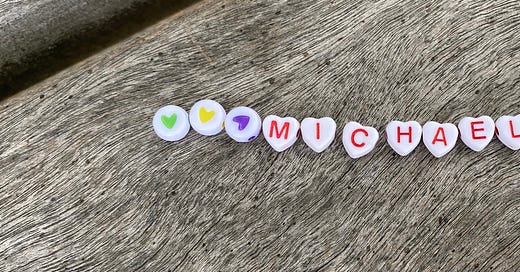Today marks four years since I woke up to get ready for a job I’d never return to. Instead I found my beloved husband Michael dead, unable to be revived. (Yeah, this is one of those posts - strap in!). I’d woken into a nightmare I couldn’t escape. Everything in my life changed. Mike was dead, my life upended, my mind and body permanently altered from the shock and trauma and grief. There wasn’t one aspect of my life that was untouched. It’s hard to explain the gravity of everything that was lost and changed from that moment onwards.
Everything that followed next was and is still extremely painful. From the initial grappling with the fact he died from fentanyl poisoning when I didn’t even realise he relapsed, and hadn’t known how likely relapse was despite his valiant efforts in recovery. To processing the horror of this new existence. Finding a way forward in this wrong timeline. Building up a new life, and new self, brick by brick. And the ache of facing it all without him.
Our instinct is to get rid of pain. Headache? Period pain? Stomachache? I have a whole section of my cupboard for what to take for each of these. We take a tablet – an over-the-counter regulated medication to ensure we get a correct dose – and it usually works. If not, we might consult a doctor and see if it needs further investigation. There are steps we can take.
Mike was in pain four years and one day ago. I didn’t know the extent of it. And this itself causes me immense pain and shame. I didn’t know how hard he was fighting. He didn’t tell me. Or couldn’t tell me due to the stigma and resultant shame. From what I’ve since learned about substance use disorder, I am left to guess that his body was screaming at him to take his pain away.
His body sought pain relief via the substance he had been addicted to – heroin. And despite years of recovery, he slipped and purchased something I can only presume he thought was heroin. But it wasn’t. It was straight fentanyl – a substance that is 100 times stronger than morphine. He was in so much pain he risked an unregulated toxic drug supply. And the shame and stigma kept him silent about taking that risk.
And it cost his life.
Sadly, he’s not alone. In British Columbia, unregulated drug toxicity is the leading cause of death for people aged 10 to 59, accounting for more deaths than homicides, suicides, accidents and natural disease combined1.
I don’t use the term “overdose” to describe his death. It wasn’t used on the coroner’s report. The term “overdose” implies both that there was a known substance involved and a correct dose to begin with. Mike died from drug toxicity due to the unregulated toxic drug supply. If he could have accessed a measured controlled substance in time. Well… everything might be different.
I am in pain and can relate to him in my pain. There have been times, especially early on, when I would have given a lot, everything even, to be out of this pain. I’m lucky I don’t have a substance use problem and the way I process my pain hasn’t come with the risk that I might die.
The substances I use are all regulated. For example, I have overindulged in alcohol to numb the pain, but luckily that substance is regulated so I knew what dose I was getting when I poured a glass of wine. Alcohol isn’t a safe substance. People die from its effects every day. But the use of it is a lot safer because it’s controlled and regulated. I don’t crack a beer and risk a lethal dose of cyanide mixed in. Similarly, I haven’t risked arsenic poisoning by drinking an oat latte. And I’ve never faced social ostracism from people finding out about my puzzle addiction (not yet anyway).
I don’t know how Mike’s pain felt or what he was thinking. And I can imagine and find a way to relate to him in my pain of grief and trauma that has been my constant companion these last four years. I can do my best to understand, as much as anyone can know another person’s mind.
He was in pain, and I can meet him there. In my pain I can connect to the pain Mike was experiencing in his last hours here on Earth. The pain I regret I didn’t understand. Not until it was heartbreakingly too late.
Not all pain can be gotten rid of. Pain tells us things. It might communicate that we’re working too hard, lifting too much, need to rest, or even that our body is growing a cancerous tumour (cute story for another time - I am hugely fun at parties).
The pain of grief is missing something that is irreplaceable. It cannot be fixed.
In this case it can only be tended. And we do that through connection. I’ve spent the day trying to connect with Mike, as best I can. And with the people that love him and love me.
And there is comfort there. Comfort in sharing my pain because not sharing it hurts more. Comfort in sharing my story to increase understanding and decrease the stigma. Comfort in sharing in the hopes of connection with others.
Source: BC Government News





